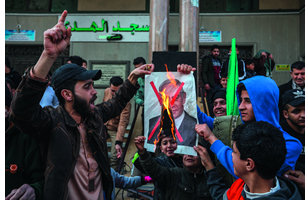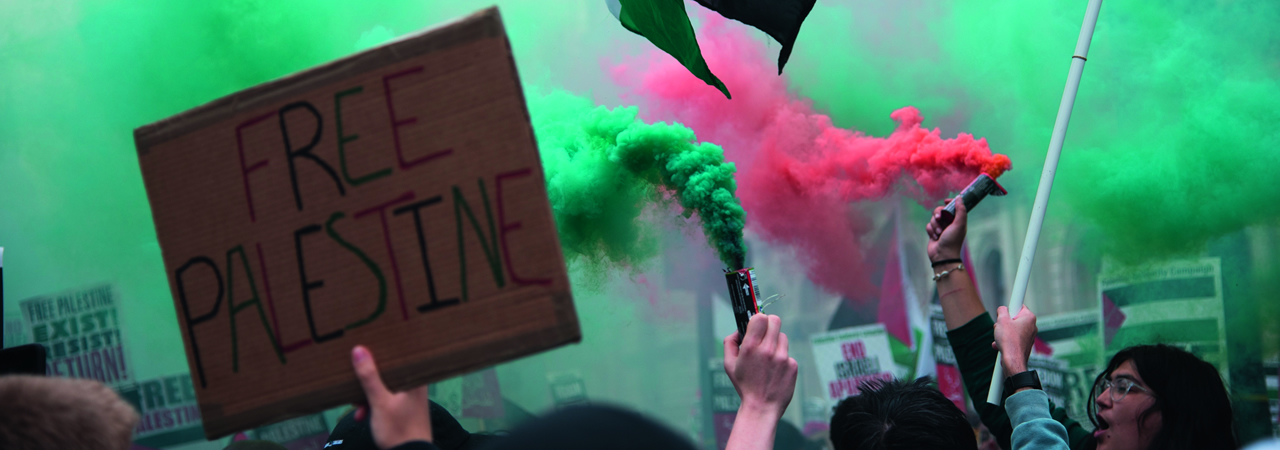Israel’s Enemies and Its Western “Friends”
Arab hatred of Jews is a religiously-branded version of Goebbels’ anti-Semitism. Western intellectuals who criticize Israel are usually ignoring this connection.
Israel is the only country in the world that’s been confronted with calls for its destruction since its beginning. The first attempt took place on May 15, 1948—just hours after Ben-Gurion announced Israel’s founding. To wipe out the country, Syrian and Lebanese forces advanced from the north, Jordanian forces from the east, and Egyptian forces from the south. This war would be “a war of extermination and momentous massacre,” warned the Arab League’s Secretary General. In fact, 6,000 Israelis had to die in the 1948 Arab-Israeli War before the attack was repelled.
In the decades that followed, Israel developed into a strong power. But its enemies nevertheless continue to want its elimination to this day: through political ostracism and economic boycotts, through wars between nations or through terror campaigns against Jewish civilians. Israel’s superior military power has proven time and again that it is the key to stopping these destructive ambitions.
And yet, Israel is the only country in the world that is consistently denied the right to adequately defend itself against its enemies. It has never threatened another nation; it has repeatedly advocated for coexistence with Palestinian Arabs and its neighboring Arab states, and its army seeks to protect civilians from “collateral damage” more than any other army in the world. Yet Israel is also branded an aggressor by many who claim to be its friends.
Today, Israel is dealing with two categories of enemies. On the one hand, there are religiously-incited Islamists financed by Tehran. They derive their “knowledge” about Jews from individual verses of the Koran and “The Protocols of the Elders of Zion.” On the other hand, there are the Western intellectuals who, under the banner of “criticizing Israel,” actively participate in the nation’s delegitimization.
From Goebbels’ anti-Semitism…
The Islamist side has one primary concern: the killing of Israeli Jews. It doesn’t matter whether a Qassam rocket or suicide bomber kills a baby or an old man, a supporter or opponent of Netanyahu … the main thing is that a Jew is killed. A gruesome ritual begins after every successful terrorist attack: while the victims are still coming to terms with the deaths, Hamas distributes sweets to children. They’re being taught from a young age that massacres of Jews are occasions for celebration. The Hamas charter says, “The Day of Judgment will not come about until Moslems fight Jews and kill them.”
What we’re dealing with here is a religiously-influenced variant of Goebbels’ anti-Semitism. Its arrival in the Middle East is well documented: In 1938, Nazi ideologists spread their hatred of Jews in meetings with the Muslim Brotherhood in Egypt. From 1939 to 1945, they indoctrinated the Arab world through their Arabic-language radio broadcasts. After Nazi Germany fell, the Muslim Brotherhood developed into the largest anti-Semitic movement in the world, with one million members. It meshed seamlessly with Hitler’s ambition to prevent a Jewish State at all costs. Their agitation played a key role in paving the way for the Arab decision to wage war on the Jewish State in 1948. It was also particularly influential to Ruhollah Musavi, who would later become famous as Iranian revolutionary leader Ruhollah Khomeini. From 1979 onwards, he made it his mission to destroy Israel. His successor, Ali Khamenei, gave Israel’s survival a deadline of 2040 at the latest, and labeled Iranian ballistic missiles with the slogan, “Israel must be wiped off the earth.”
…To the “enlightened” who are just “criticizing Israel”
These “Israel critics” aren’t talking about Israel’s extinction. Nevertheless, anti-Semitism researcher Léon Poliakov renders this verdict on them: “Anyone who does not denounce anti-Semitism in its primitive and elementary form, and does not do so precisely because it is primitive and elementary, will have to face the question as to whether he is not thereby sending out a sign of secret approval to anti-Semites all over the world.” The “enlightened” or “progressives” may believe that their “criticism of Israel” is neutral. Their criticism ignores the obvious fantasies of Israel’s obliteration, as harbored by its Islamist enemies, thereby trivializing their anti-Semitism.
One example is Jewish philosopher Judith Butler. In 2006, she called for “understanding Hamas, Hezbollah as social movements that are progressive, that are on the Left, that are part of a global Left.” To this day, she refuses to recognize the ideological motives which drive Islamists and their anti-Semitism. This worldview delegitimizes Israel’s defense efforts by acting as if there’s no reason for them, while at the same time blaming the Jewish State for Islamist violence. It’s unsurprising that Butler is one of the leading champions of the BDS (Boycott, Divestment, and Sanctions) movement.
 A milder form of hostility against Israel is demonstrated by those who acknowledge the Islamists’ anti-Semitism and its aggressive character, but attest to mitigating circumstances. For example, Islamic researcher Jochem Müller insists, “Arab antisemitism, in contrast to European anti-Semitism, is at least based on a real problem; namely, the marginalization of the Palestinians.” This paradigm distinguishes between Nazi-like European anti-Semitism, and the “at least” understandable hatred of Jews in the Middle East. But it ignores the Nazi influence on how Jews are perceived by many Middle Eastern Muslims. It also requires a fair amount of ignorance about pronouncements made by Islamist groups, such as the Hamas charter. Clearly, those who blame Israel for anti-Semitism in the Middle East are trying to preserve a basic assumption: that the Palestinians are always the victims, and the Israelis are always the perpetrators.
A milder form of hostility against Israel is demonstrated by those who acknowledge the Islamists’ anti-Semitism and its aggressive character, but attest to mitigating circumstances. For example, Islamic researcher Jochem Müller insists, “Arab antisemitism, in contrast to European anti-Semitism, is at least based on a real problem; namely, the marginalization of the Palestinians.” This paradigm distinguishes between Nazi-like European anti-Semitism, and the “at least” understandable hatred of Jews in the Middle East. But it ignores the Nazi influence on how Jews are perceived by many Middle Eastern Muslims. It also requires a fair amount of ignorance about pronouncements made by Islamist groups, such as the Hamas charter. Clearly, those who blame Israel for anti-Semitism in the Middle East are trying to preserve a basic assumption: that the Palestinians are always the victims, and the Israelis are always the perpetrators.
But what’s behind this obsessive tendency to denounce Israel and blame the Jews themselves for anti-Semitism? I suspect that on some subconscious level, it’s a function of emotion and guilt. We need to bear in mind that there’s a temptation that lies in the ability to generally accuse the Israelis of violating human rights. It puts us in a self-righteous position, even as we reckon with our own national sins.
This black/white dichotomy, in which we reflexively attribute every possible evil to the Jewish State, is even ingrained in our language. We’ve spoken of the “Middle East conflict” for decades, as if this were the only one. This turn of phrase semantically glosses over the fact that nearly every Arab country is dealing with devastating conflicts, killing 500,000 people in Syria and 370,000 in Yemen.
“But a single word can compactly and subtly convey an entire concept and, when used persistently, mold our consciousness,” writes Ben Segenreich. “Anyone who says ‘the Middle East conflict’ is suggesting that we just need to solve this specific conflict, and then peace will break out across the entire region and world peace will be secured. […] And there’s an undertone of, ‘Israel got us into this mess. It would be better for world peace if Israel had never come into being, or if it could at least be at peace now.’”
Hostility against Israel isn’t just expressed directly, but also indirectly—both through “criticism” and in the form of linguistic conventions that perpetuate resentment against Israel. But what’s especially bad is the indifference with which Western “critics” trivialize the existential threat that the Iranian regime and its subjects pose to Israel.
In 1941, Thomas Mann rendered a verdict on anti-fascism that fits well here: “Whoever is not against evil, passionately and with his whole soul, is more or less for it.”
News from Israel - 05/2024


